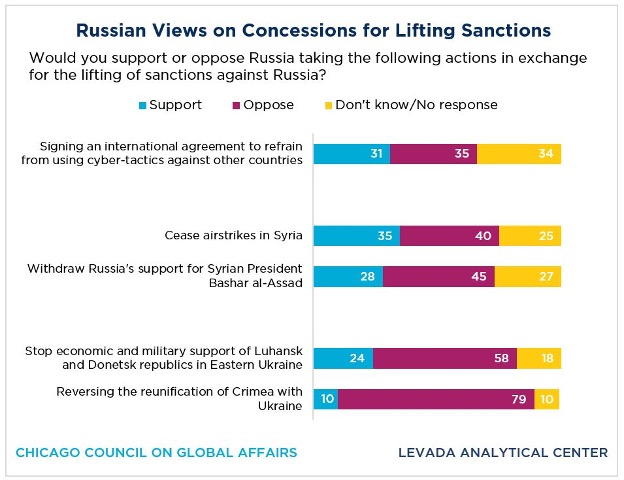ICYMI: Recent Council Surveys on Russia-US Relations

Americans and Russians agree on few matters as each believe the other is influencing their domestic affairs.
New polls are in from Russia and the US and again their findings offer a mixed bag: a grim outlook on the future of US-Russian relations and glimmers of hope for engagement on mutual interests.
Last year, Russians and Americans alike thought that Donald Trump would improve US-Russian relations. Russians have since realized this will not be the case (51% think US-Russian relations haven’t changed under Trump). Instead, mistrust abounds as both sides think the other is trying to influence their domestic affairs (78% of Russians think the US tries to influence its domestic affairs, 69% of Americans think Russia tries to influence its domestic affairs). And while the majority of Russians think their country needs to improve relations with the US and other Western countries (75%), they remain largely unwilling to see their government make concessions in exchange for lifting US sanctions. This does not bode well for the relationship as Americans are committed to maintaining (39%) or increasing these sanctions (38%).

Where do Russians and Americans agree? Neither sees a settlement to the Syrian Civil War with Assad remaining president as ideal; more Russians oppose (49 percent) than support (27 percent) using Russian troops to prevent his overthrow. And while more than two-thirds of Americans would support a settlement to the Syrian crisis that establishes a new leader (70%), only a quarter would support a settlement that allows Assad to remain in power (25%). Per usual, matters of international security are where Americans and Russians most agree. Both publics believe that international terrorism (75% Americans, 70% Russians), nuclear proliferation (62% Americans, 52% Russians), and Islamic fundamentalism (59% Americans, 52% Russians) pose a critical threat to their countries’ interests over the next ten years.
Read more in the Council’s three issue briefs on the US-Russian relationship, American and Russian views on sanctions, and American and Russian views on the crisis in Syria and North Korea’s nuclear program. And stay tuned: these briefs are the first in a two-year project, generously funded by the Carnegie Corporation, to study the US-Russian relationship through the lens of public and elite opinion.



